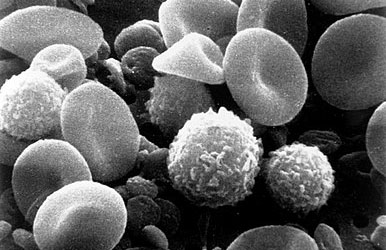SCIENCE | BIOMARKERS
Blood Cells
Blood biomarkers such as white blood cell count and red blood cell distribution width (RDW) are useful for predicting mortality and health outcomes. Elevated levels of these biomarkers are associated with increased risks of cardiovascular disease, all-cause mortality, and non-cardiovascular mortality.

PUBLICATIONS
- Blood-borne biomarkers of mortality risk: systematic review of cohort studies.
-
-
-
- PLoS One. 2015 Jun 3;10(6):e0127550.
- Design: Systematic review of prospective cohort studies with a minimum of two years follow-up.
- Summary: Identified 20 blood-borne biomarkers associated with mortality risk, including C-reactive protein and white blood cell count. These biomarkers can predict healthy aging post-retirement.
-
-
-
- Red blood cell distribution width and risk of cardiovascular events and mortality in a community cohort in Taiwan.
-
-
-
- Am J Epidemiol. 2010 Jan 15;171(2):214-20.
- Design: Community cohort study in Taiwan with 3,226 participants.
- Summary: Elevated RDW levels were associated with increased risk of all-cause mortality and non-CVD mortality but not CVD events. RDW may precede anemia in predicting non-CVD death.
-
-
-
- The association between circulating white blood cell count, triglyceride level, and cardiovascular and all-cause mortality: population-based cohort study.
-
-
-
- Atherosclerosis. 2007 May;192(1):177-83.
- Design: Prospective population-based cohort study in Australia with 2,904 individuals.
- Summary: Elevated WBC count and triglyceride levels were associated with increased cardiovascular and all-cause mortality. Combined exposure to high WBC count and triglyceride level indicated a three-fold risk of cardiovascular mortality.
-
-
-
- White blood cell count and risk for all-cause, cardiovascular, and cancer mortality in a cohort of Koreans.
-
-
-
- Am J Epidemiol. 2005 Dec 1;162(11):1062-9.
- Design: 10-year prospective cohort study of 437,454 Koreans.
- Summary: Higher WBC counts were associated with increased risk of all-cause and ASCVD mortality, but not cancer mortality. This association was observed in both smokers and non-smokers.
-
-
-

